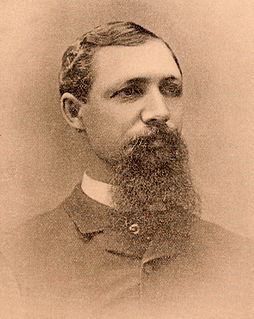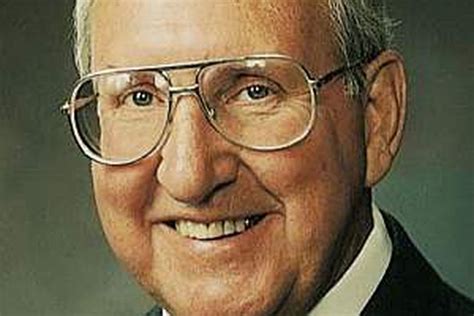A Quote by Alistair Begg
It is in our forgiveness of other people’s sins against us that we reveal the fact that we have been truly forgiven by God.
Related Quotes
Now, justification in this life is given to us according to these three things: first by the laver of regeneration by which all sins are forgiven; then, by a struggle with the faults from whose guilt we have been absolved; the third, when our prayer is heard, in which we say: 'Forgive us our debts,' because however bravely we fight against our faults, we are men; but the grace of God so aids as we fight in this corruptible body that there is reason for His hearing us as we ask forgiveness.
The person who is living by grace sees this vast contrast between his own sins against God and the offenses of others against him. He forgives others because he himself has been so graciously forgiven. He realizes that, by receiving God’s forgiveness through Christ, he has forfeited the right to be offended when others hurt him.
This doctrine of forgiveness of sin is a premium on crime. Forgive us our sins means Let us continue in our iniquity. It is one of the most pernicious of doctrines, and one of the most fruitful sources of immorality. It has been the chief cause of making Christian nations the most immoral of nations. In teaching this doctrine Christ committed a sin for which his death did not atone, and which can never be forgiven. There is no forgiveness of sin. Every cause has its effect; every sinner must suffer the consequences of his sins.
We trample the blood of the Son of God underfoot if we think we are forgiven because we are sorry for our sins. The only reason for the forgiveness of our sins by God, and the infinite depth of His promise to forget them, is the death of Jesus Christ...No matter who or what we are, God restores us to right standing with Himself only by means of the death of Jesus Christ...To identify with the death of Jesus Christ means that we must die to everything that was never a part of Him.
It is essential that we renew our covenants by partaking of the sacrament. When we do this with a sincere heart, with real intent, forsaking our sins, and renewing our commitment to God, the Lord provides a way whereby sins can be forgiven from week to week. Simply eating the bread and drinking the water will not bring that forgiveness. We must prepare and then partake with a broken heart and contrite spirit. The spiritual preparation we make to partake of the sacrament is essential to receiving a remission of our sins.
God is faithful and just to forgive us our sins and to cleanse us from all unrighteousness. So to confess is to breathe in and to ask God to forgive me of my sins. And as we breathe out we breathe out the impure air and breathe in the pure air. I would say the pure air is knowing that God has forgiven us of our sins.
Fear is not at the heart of Christianity nor of our nation. The very essence of Christian faith lies in forgiveness. Christians believe that Jesus died so we may live. He took upon himself our sins so that we may be forgiven and thereby gave us a model of forgiveness for others. This is a cycle that allows civility and progress in the face of man's faults and imperfectability.
... the Lord Jesus said, 'To those who are in bonds, Come out, and to those who are in prison, Go forth' (Isa. 49:9); so your sins are forgiven. All, then, are forgiven, nor is there any one whom He has not loosed. For thus it is written, that He has forgiven 'all transgressions, doing away with the handwriting of the ordinance that was against us' (Col. 2:13-14). Why, then, do we hold the bonds of others, while we enjoy our own remission? He, who forgave all, required of all that what every one remembers to have been forgiven to himself, he also should forgive others.
Do we refuse to forgive? God, too, will refuse to forgive us. As we treat our neighbors, so also does God treat us. The forgiveness or unforgiveness of your sins, then, and hence also your salvation or destruction, depend on you yourself. For without forgiveness of sins there is no salvation. You can see for yourself how serious it is.
Besides loving each other, we must bear with each other and pardon ? 'forgive them that trespass against us' ? in order that our heavenly Father may 'forgive us our trespasses' (Mt. 6:14). Thus, with all your soul honor and love in every man the image of God, not regarding his sins, for God alone is Holy and without sin; and see how He loves us, how much He has created and still creates for us, punishing us mercifully and forgiving us bounteously and graciously. Honor the man also, in spite of his sins, for he can always amend.
Jesus' forgiveness of our sins is the single most impactful part of the gospel, and when we forgive others who sin against us we're shining his light most brilliantly. Every act of forgiveness brings a touch of Heaven to Earth, and it makes the gospel look as otherworldly and supernatural as it is. Forgiveness is constructed in the DNA of the persecuted.
There are two gods. The god our teachers teach us about, and the God who teaches us. The god about whom people usually talk, and the God who talks to us. The god we learn to fear, and the God who speaks to us of mercy. The god who is somewhere up on high, and the God who is here in our daily lives. The god who demands punishment, and the God who forgives us our trespasses. The god who threatens us with the torments of Hell, and the God who shows us the true path.
There are two gods. A god who casts us off because of our sins, and a God who calls to us with His love.




































